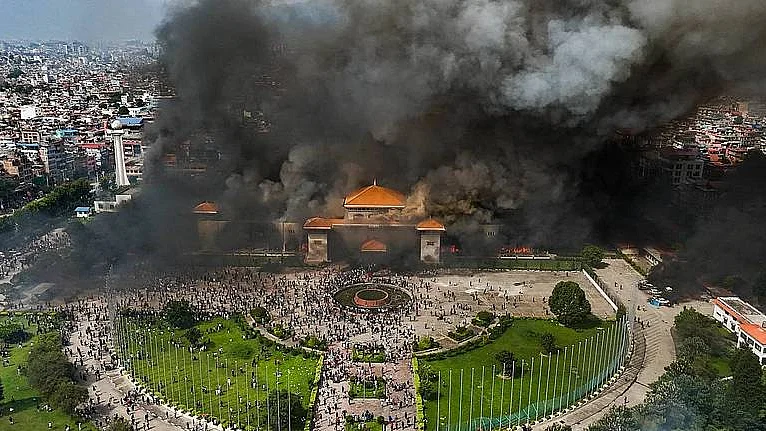Nepal's political crisis deepens as major parties demand Parliament reinstatement
In a rare show of unity, eight parties – including the Nepali Congress, CPN-UML and Maoist Centre – issued a joint statement on Saturday, accusing President Poudel of acting unconstitutionally

Nepal’s leading political parties have jointly called on President Ram Chandra Poudel to reinstate the House of Representatives, following its dissolution amid violent anti-corruption protests that have left over 50 people dead.
In a rare show of unity, eight parties – including the Nepali Congress, CPN-UML and Maoist Centre – issued a joint statement on Saturday, accusing President Poudel of acting unconstitutionally.
“In a statement, eight parties - including the Nepali Congress, CPN-UML and Maoist Centre - said the president acted unconstitutionally.”
The President dissolved Parliament on Friday, acting on the recommendation of newly-appointed interim Prime Minister Sushila Karki. The dissolution was also a central demand of the protest movement that has rocked the country in recent weeks.
The protests erupted after the government imposed a ban on 26 social media platforms, including WhatsApp, Instagram and Facebook. Although the ban was lifted on Monday, anger had already escalated. “The ban was lifted on Monday – but by then the protests had swelled into a mass movement.” On Tuesday, demonstrators set fire to Parliament and other key government buildings in Kathmandu, prompting the resignation of Prime Minister KP Sharma Oli.
Karki, a former Supreme Court chief justice and Nepal’s first female head of government, was sworn in during a brief ceremony in the capital. “Karki, a 73-year-old former Supreme Court chief justice and the first woman to lead the impoverished Himalayan nation, was sworn in during a brief ceremony in the capital Kathmandu.”
She is expected to form her interim cabinet within days. While she enjoys support from student leaders in the "Gen Z" protest movement due to her clean public image, her administration faces immediate challenges.
These include restoring law and order, rebuilding damaged government structures, addressing demands for early elections, and maintaining democratic integrity. “Her cabinet will face multiple challenges, including restoring law and order, reconstructing Parliament and the other key buildings that were attacked, reassuring the Gen Z protesters who want change – and others in Nepal who are fearful its young democracy and constitutional order could be derailed.”
Saturday’s statement from the eight parties, signed by their chief whips, stated that dissolving the Parliament undermines the judiciary's past precedents. “They argued the step taken by the president was unconstitutional and against the precedents set by Nepal's judiciary.”
The student-led “Gen Z” movement had indeed called for Parliament’s dissolution and fresh elections, now scheduled for 5 March. However, the parties contend that such decisions must come from “an institution voted by the people”.
President Poudel is yet to respond publicly to the appeal.
In a sign that tensions may be easing, soldiers deployed to Kathmandu during the unrest returned to their bases after Karki took office. Still, Nepal faces lingering uncertainty as it recovers from the most serious civil unrest in decades. The social media ban and rising anger over political nepotism and corruption triggered the initial protests, amplified by a viral “nepo kid” campaign highlighting the extravagant lifestyles of politicians’ children.
Follow us on: Facebook, Twitter, Google News, Instagram
Join our official telegram channel (@nationalherald) and stay updated with the latest headlines
